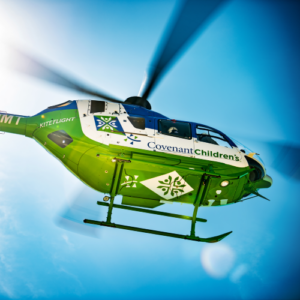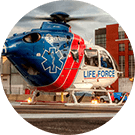Specialty hospitals focus on treating specific types of illnesses or injuries. Many parts of the country are served by rural health clinics or small nearby hospitals with very limited medical care, meaning almost any serious illness will require a trip to a more advanced medical facility. Unlike general hospitals, specialty hospitals have the appropriate equipment and staff trained to handle specific, higher-acuity health conditions. Let’s look at four types of frequently needed specialty hospitals and why someone might require them instead of a smaller, nearby hospital.
Children's Hospitals
Children’s hospitals focus on treating infants, children, and teenagers. These hospitals are designed to be child-friendly to help young patients feel more comfortable. They have pediatric specialists in various fields such as cancer, heart, and brain diseases. Children have unique medical needs that differ from adults. For example, a child’s body processes medications differently, and some illnesses only happen in pediatric patients. Specialized care in a children’s hospital ensures that young patients receive the right treatments for their age and developmental stage. Whether it’s dealing with chronic illnesses like asthma or emergencies like broken bones, children’s hospitals provide the specialty care that kids need.
Burn Centers
Burn centers specialize in treating patients who have suffered severe burns or burns to parts of the body which need advanced burn care (like the hands). These hospitals have advanced equipment for managing burn injuries, including special beds, wound care supplies, and skin grafting technology. If someone gets a severe burn from fire, chemicals, or electricity, they may need quick and specialized care. Burn centers provide treatments to prevent infections, manage pain, and help the skin heal. Quick and specialized treatment can make a big difference in the patient’s recovery and long-term outcomes.
Cardiac Centers
Cardiac centers specialize in treating heart-related conditions. These hospitals have advanced technology for diagnosing and treating heart diseases, including heart attacks and irregular heartbeats. The staff at cardiac centers include cardiologists,
electrophysiologists, surgeons, and other healthcare professionals who focus on the treatment of heart conditions.
Heart disease is one of the leading causes of death worldwide. If someone has symptoms like chest pain, shortness of breath, or irregular heartbeats, they may need to visit a local hospital and then transfer to a cardiac center for specialized care. Early diagnosis and treatment can significantly improve the chances of recovery and prevent further complications for patients.
Stroke Centers
Stroke centers specialize in treating strokes, which occur when the blood supply to part of the brain is interrupted or reduced. These centers have advanced imaging technology to quickly diagnose the type of stroke and offer treatments like clot-busting drugs or surgery to remove blockages. Because strokes can cause lasting brain damage and even death if not treated quickly, time is critical in stroke treatment. Specialized stroke centers are equipped to provide specialized care to patients and can save lives and minimize long-term damage.
Specialty hospitals play an important role in providing targeted care for specific health conditions. Often, they are in major cities far from nearby rural hospitals where patients are first evaluated. Whether it’s treating severe burns, caring for children, managing heart diseases, or addressing strokes, these hospitals offer the expertise and equipment necessary for effective treatment. Understanding the purpose and benefits of each type of specialty hospital can help you make informed decisions about healthcare for yourself or your loved ones. Learn how AirMedCare Network (AMCN) provides rapid access from nearby local hospitals to specialty hospitals and ICU-level care onboard our providers’ aircraft – costing our members nothing out of pocket for this lifesaving care at www.airmedcarenetwork.com.
Frequently Asked Questions:
If an AirMedCare Network Provider does not transport you, you will be responsible for payment. Our membership program only covers transports provided by our affiliates.
There is no limit to the number of transports a member may take in a year. Each transport is handled the same way and must be an emergent or time-sensitive transport as determined by a physician (or other appropriate provider) or first responder unaffiliated with AMCN.
With an AirMedCare Network membership, any person or persons who reside under one (residential) roof are covered. In the event we have a member who lives in a duplex or apartment complex, we designate the primary member’s residence/address— that is considered the “one roof”. Undergraduate college students can be covered under their parent’s membership as well as anyone previously residing in the household who is then moved to a permanent care facility.

Prepare for Travel with Expert Pre-travel Health Tips
Pre-travel health care is important for both domestic and international trips. It helps ensure you are ready to handle any common health problems that might

Neonatal Intensive Care – Be prepared for baby with this important information.
Having a child can be both exciting and a little scary. New parents want to be ready for their baby’s arrival and make sure they

Snowbirds and Expats Should Consider Air Medical Membership
Each year, millions of Americans spend the winter months in sunnier locales like Florida, Nevada and Arizona. Unfortunately, illness or injury during travel can lead




